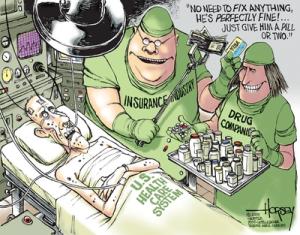- MENU
- HOME
- SEARCH
- WORLD
- MAIN
- AFRICA
- ASIA
- BALKANS
- EUROPE
- LATIN AMERICA
- MIDDLE EAST
- United Kingdom
- United States
- Argentina
- Australia
- Austria
- Benelux
- Brazil
- Canada
- China
- France
- Germany
- Greece
- Hungary
- India
- Indonesia
- Ireland
- Israel
- Italy
- Japan
- Korea
- Mexico
- New Zealand
- Pakistan
- Philippines
- Poland
- Russia
- South Africa
- Spain
- Taiwan
- Turkey
- USA
- BUSINESS
- WEALTH
- STOCKS
- TECH
- HEALTH
- LIFESTYLE
- ENTERTAINMENT
- SPORTS
- RSS
- iHaveNet.com
by Bernadine Healy M.D.

Prominent healthcare economist talks about high prices, medical insurance, and rationing
If there were a Straight Talk Express for health economists, Princeton professor Uwe Reinhardt would be the engineer.
Born in Germany and raised in Canada, Professor Reinhardt has personally experienced medical systems in different countries.
Over the past 25 years, he has become a critical voice in the debate about reforming America's healthcare system. He spoke with Dr. Bernadine Healy about today's healthcare costs and efforts to overhaul the system.
Excerpts:
Uwe, you're hard to pigeonhole on health reform
This drives my students nuts. They say, "Are you a Republican or a Democrat?" I say, "Should that matter?" I'm partly libertarian, but I do come out for universal coverage.
Why has President Obama made reform so urgent?
Obama said what the cost of healthcare did to GM it could do to the nation.
This was hyperbolic, of course, but with the GDP down 6 percent in the first quarter and flat economic growth ahead, healthcare can't go marching on as if nothing has happened. It is now 18 percent of the shrinking GDP and projected to be 40 percent by 2050, according to the White House.
If the increase gobbles up SUVs and fast foods, that might not be too bad. But if it displaces money to educate children, that's a real trade-off.
Human capital is what has made America great.
Is it mostly that our healthcare prices are too high?
A bunch of us wrote a paper a few years ago called "It's the Prices, Stupid."
Europe has a lot more physicians and hospitalizations per capita and takes more medicine. But our prices are much, much higher for the same things.
The good side is that high prices have allowed incredible innovation because medical technology and delivery systems have been able to slosh around in money. The bad side is that in 10 years, Americans on the bottom half of the income ladder won't be able to afford healthcare.
One thing that is really puzzling is that for Medicare patients we spend twice the money in Miami and McCallum, Texas, as we do in San Francisco. This geographic variation has been known for about 25 years, but Congress has never appropriated the research budget to figure out what's really going on.
Obviously, if you compare area averages, that's pretty crude science.
You really want to go down to the individual level and see if these patients are different. They might be. But you need very good data on individual patients, even social factors and religion. Now the White House is saying that it is going to slam down on these high cost areas, but you don't really know enough yet.
Why don't individual healthcare consumers bargain for better prices?
My wife, May, called up the Princeton hospital and asked what a normal delivery would cost. She got nowhere. I called about a colonoscopy and got the same runaround. So I asked a guy at New Jersey Blue Cross. He just roared. "Are you serious? We pay 50 prices. We pay every hospital a different price. We pay the same hospital five different prices."
I asked, "Are they public? Can I look them up?" The answer was, "No. That's proprietary."
Imagine if a bunch of people were blindfolded, shoved into Macy's, and told to shop prudently.
For years, I've argued hospitals should post their fees relative to Medicare. I've put it to the White House, the Senate.
People look at me: "Are you serious? Transparency?"
What about reforming health insurance?
The insurance market is chaotic.
We need to have one basic, standard package that is respectable. Hairpieces don't have to be covered, but in connection with cancer, I could see why they should be.
The Dutch had a national debate whether they should socialize the cost of fertility treatments. Making such choices has always made Americans gun-shy.
That does bring up the "R" word. Won't health reform mean rationing hip replacements or end-of-life care?
How much could you really save on end-of-life care? For now, we have more than enough inefficiencies not to have to make those harsh decisions.
My feeling is our kids will be the ones who have to figure this part out. Our generation did civil rights and women's liberation.
Let them do this. They will face millions of baby boomers with zero net worth.
I say to my students, "You will have to take care of them somehow. You cannot put them on an ice floe -- especially with global warming."
WORLD | AFRICA | ASIA | EUROPE | LATIN AMERICA | MIDDLE EAST | UNITED STATES | ECONOMICS | EDUCATION | ENVIRONMENT | FOREIGN POLICY | POLITICS
Uwe Reinhardt: Plain Talk on Healthcare Reform
If there were a Straight Talk Express for health economists, Princeton professor Uwe
Reinhardt would be the engineer. Born in Germany and raised in Canada, Professor Reinhardt has personally experienced medical systems in different
countries. Over the past 25 years, he has become a critical voice in the debate about reforming America's healthcare system